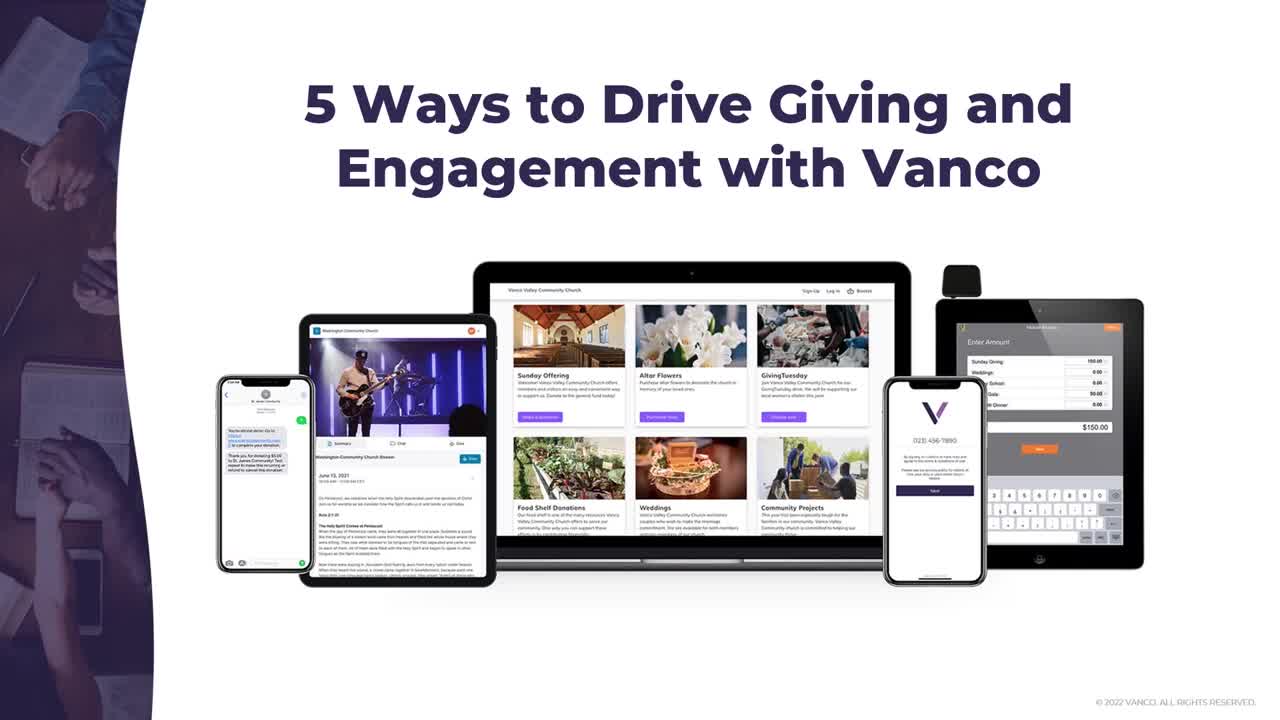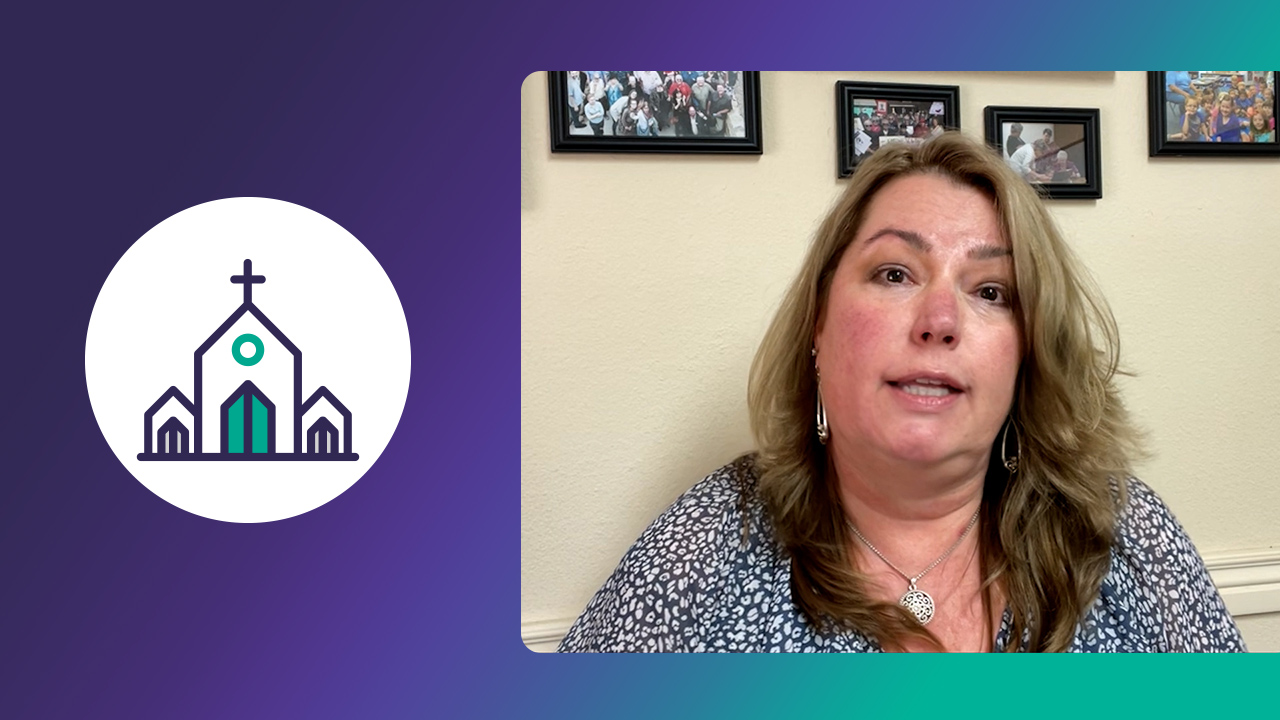
Money isn’t the heart of the church, but let’s be honest: it keeps the lights on, supports ministry and fuels outreach. Good stewardship of money is more than paying bills; it reflects faith, trust and responsibility. When managed wisely, church finances empower growth, deepen community impact and reinforce transparency.
Yet, many churches struggle with financial responsibility, often leading to difficult conversations and strained ministries. Did you know religious organizations received $135.78 billion in donations in 2021? The question is, how well is that money being managed? Your approach to church budgeting and good stewardship of money could make all the difference.
Table of Contents
- Biblical Principles of Stewardship
- How Poor Stewardship Impacts Church Health
- Best Practices for Good Money Stewardship in Churches
- Leveraging Digital Tools for Better Financial Oversight
- How Vanco Supports Church Stewardship
- FAQs
Biblical Principles of Stewardship

Living out good stewardship of money in church isn’t just about keeping the lights on; it’s about:
- Trust
- Integrity
- Making sure every dollar serves a purpose
Money is a tool for ministry and when handled wisely, it strengthens faith and community.
The Bible lays a clear foundation for church financial health. Luke 16:10 reminds us, "whoever is faithful with very little will also be faithful with much.” It’s a simple but powerful truth. If a church struggles to manage small resources, bigger ones won’t magically fix the problem. Thoughtful financial decisions today lead to stronger ministries tomorrow.
Integrity plays a significant role in church financial practices. Proverbs 3:9 calls believers to honor God with their wealth and responsible church giving. That means:
- Being transparent with finances
- Making responsible choices
- Ensuring church funds go where they’re meant to
People are more likely to tithe when they see that money is used wisely. At the heart of biblical stewardship is accountability. If your Church takes church budgeting seriously, you:
- Avoid financial stress
- Build confidence among members
- Have a clear plan for the future
How Poor Stewardship Impacts Church Health
Talking about church money isn’t always easy, but it’s necessary. People give because they believe in the mission and trust leadership to handle those funds wisely. When that trust is broken, it’s not just the budget that suffers; it’s the heart of the church itself.
Loss of trust among members
Trust is fragile and when it’s abused, people don’t know how their tithes and offerings are used. A Lifeway Research study found that 50 percent of Protestant pastors said the economy was straining their churches.
However, in many cases, financial strain isn’t just about external pressures; it’s about internal management. When giving statements are vague, budgets lack transparency or funds seem to disappear into a “miscellaneous” black hole, people notice.
Once doubt creeps in, donations slow down and engagement fades. The African Methodist Episcopal Church’s financial scandal is a sobering reminder: even well-established churches can falter without strong financial responsibility.
Budget challenges and ministry limitations
Have you ever had to choose between fixing a leaky roof and funding a mission trip? Churches without solid church financial practices always face tough decisions like this. A Liberty University study found that churches with precise internal controls had stronger financial accountability.
Without these safeguards, budgets can spiral out of control, leaving ministries underfunded. Staff may have to take pay cuts, outreach efforts may shrink and even essential maintenance can become a luxury. Focusing on spiritual growth is hard when you’re worried about whether the lights will stay on.
Missed opportunities for growth and outreach
Generosity thrives on confidence. People want to give, but they also want to know that their gifts make a real difference.
Research from Outreach Magazine found that churches with transparent financial management saw a 57-percent increase in donations. That’s not a coincidence. When people see where their money is going and feel confident in the church’s financial health, they’re more willing to give.
When financial health is strong, your church isn’t just surviving; it’s expanding its impact in ways that truly matter.
Best Practices for Good Money Stewardship in Churches
Creating a transparent budget
If only a handful of people see your budget, it’s time to rethink the process. A clear, well-structured budget reassures your congregation that resources are being used responsibly.
The key is to make it detailed enough to be meaningful but straightforward enough that anyone can understand where the money is going.
Break it into categories:
- Operating costs
- Staff salaries
- Missions
- Outreach programs
This way, people can see how their contributions support the church’s work. Of course, transparency doesn’t mean sharing every line item, but it does mean clearly showing priorities and expenses. When people see the numbers, they’ll stay engaged and continue giving.
Financial reporting and accountability
Nobody likes financial surprises (at least not those involving missing funds or unexpected shortfalls). Regular reporting keeps everything on track and ensures that issues don’t go unnoticed.
A church's financial health report, whether monthly or quarterly, should be reviewed by leadership and made available to members in an accessible way.
Having internal checks and balances is just as important. Financial oversight isn’t about distrust, but protecting the church and its mission. One study on financial responsibility in churches found that churches implementing strong accountability measures saw fewer financial issues and greater trust among members.
Incorporate simple practices like:
- Requiring two people to approve significant expenses
- Rotating financial oversight roles
- Conducting regular financial reviews
It can go a long way in preventing problems before they start.
Involving the congregation and leadership team
Church finances shouldn’t be a mystery and shouldn’t be a leadership-only concern. Teaching the congregation about biblical stewardship helps shift the conversation from obligation to opportunity.
People want to know that their giving makes a real impact and the more informed they are, the more invested they’ll be.
Consider:
- Hosting financial Q&A sessions
- Publishing an annual financial report
- Offering biblical money management tools for churches to help members make wise financial decisions in their own lives.
When people see their church practicing what it preaches about financial wisdom, they’re more likely to trust leadership and continue supporting the mission.
Leveraging Digital Tools for Better Financial Oversight
Handling church finances can feel like a never-ending to-do list. You’re managing donations, tracking budgets and making sure every dollar is accounted for, all while trying to focus on ministry.
The good news? You don’t have to do it alone. Digital tools make church financial accountability easier, more efficient and less stressful.
How platforms like Vanco simplify giving and reporting
Manually tracking donations and updating spreadsheets is no one’s idea of a good time. That’s where Vanco steps in. Our platform integrates with 60+ church management software (ChMS) systems, so your giving records automatically sync without the hassle of duplicate data entry. Less time reconciling numbers means more time for the things that matter.
Plus, let’s talk about reporting. Digging through financial records shouldn’t feel like solving a mystery. Vanco’s detailed reporting dashboard gives you real-time insights into donations, trends and recurring giving, all in one place. Clear, easy-to-read data helps you plan and build trust with your congregation.
Benefits of automating donations and tracking
People forget things, even with good intentions. Automated giving ensures that donations keep coming in, even when attendance dips. With 49 percent of all church-giving transactions happening via credit card, having a system that processes and tracks those gifts securely makes sense.
Plus, digital tracking is a huge win for financial responsibility in churches. Churches prioritizing transparency see better engagement, with 57 percent reporting increased giving when they openly communicate financial management (Outreach Magazine). People give more when they trust that their money is being handled well.
Budget planning with modern church finance tools
A well-planned budget ensures your church can serve its mission without financial stress. The right money management tools for churches give you real-time data and forecasting so you can make informed decisions instead of guessing.
Good stewardship means using the right tools to manage finances wisely.
How Vanco Supports Church Stewardship
Managing church money well fosters trust, ensures transparency and makes giving as easy as possible for your congregation. That’s where Vanco comes in.
With a robust set of tools designed specifically for churches, Vanco helps you streamline church financial health, boost generosity and simplify administrative tasks so you can focus on ministry.
Overview of features and benefits
Vanco isn’t just another payment processor. It’s a money management partner designed to help churches like yours thrive. Here’s what sets us apart:
- Flexible Giving Options: Whether members prefer credit cards, ACH transfers, text-to-give or kiosks, Vanco supports multiple giving methods and with 49 percent of all church-giving transactions happening via credit card, this flexibility matters.
- Seamless Church Management Software (ChMS) Integration: Vanco connects with over 60+ ChMS platforms to ensure smooth financial reconciliation. Learn more about our integrations.
- Advanced Reporting Tools: Vanco’s detailed dashboards offer real-time insights into giving trends, helping you make informed financial decisions. Check out our reporting tools.
- Security and Compliance: With best-in-class encryption and fraud prevention measures, Vanco ensures your church’s financial data is protected.
- Automated Giving: Encourage consistent donations with recurring giving options that help sustain ministries year-round.

Real-world impact and testimonials
Seeing real churches succeed with Vanco is the best proof of its effectiveness. Take Heidi’s story, for example. She saw firsthand how Vanco simplified giving and improved engagement in her church. Watch Heidi’s testimonial.

Beyond individual success stories, Vanco’s impact is evident in broader trends. A benchmark study of 25,000 churches revealed that those using Vanco experienced a 159-percent increase in online giving over five years. Explore the complete research.
Speak with a coach
Every church has unique financial needs and the best way to see if Vanco is right for you is to explore it firsthand. Speak with a giving coach to discover how Vanco can support financial accountability in your church. Schedule a demo today.
FAQs
What does good stewardship of money mean in a church?
It’s about handling church finances with wisdom and care. It means using donations responsibly, transparency and ensuring every dollar supports your mission.
How can churches practice better money stewardship?
Start with clear financial policies, regular budget reviews and open conversations with your congregation. People give more when they trust that leadership is handling funds wisely. Plus, an organized budget means fewer financial surprises.
Why is financial stewardship important for church health?
A church can’t thrive on faith alone. Good financial stewardship keeps ministries running, prevents budget headaches and helps your church grow. When finances are in order, you can focus on serving people instead of scrambling to pay bills.
What tools help churches with financial stewardship?
- Digital giving platforms
- Budgeting software
- Automated reports
These take the guesswork out of managing church funds. The right tools make life easier for leadership and ensure finances don’t feel like a never-ending math problem.
How does stewardship affect church growth?
When finances are handled well and wise church money principles are followed, churches can expand ministries, reach more people and create a lasting impact. Trust grows, giving increases and your church can do more of what it’s called to do.
Get the Free eBook to Improve Church Stewardship
Keeping the lights on, the doors open and missions funded aren't what inspired most church leaders to pick their careers, but they are key to the health of each church and congregation. Discover how to become a master of church stewardship with our ultimate guide.











